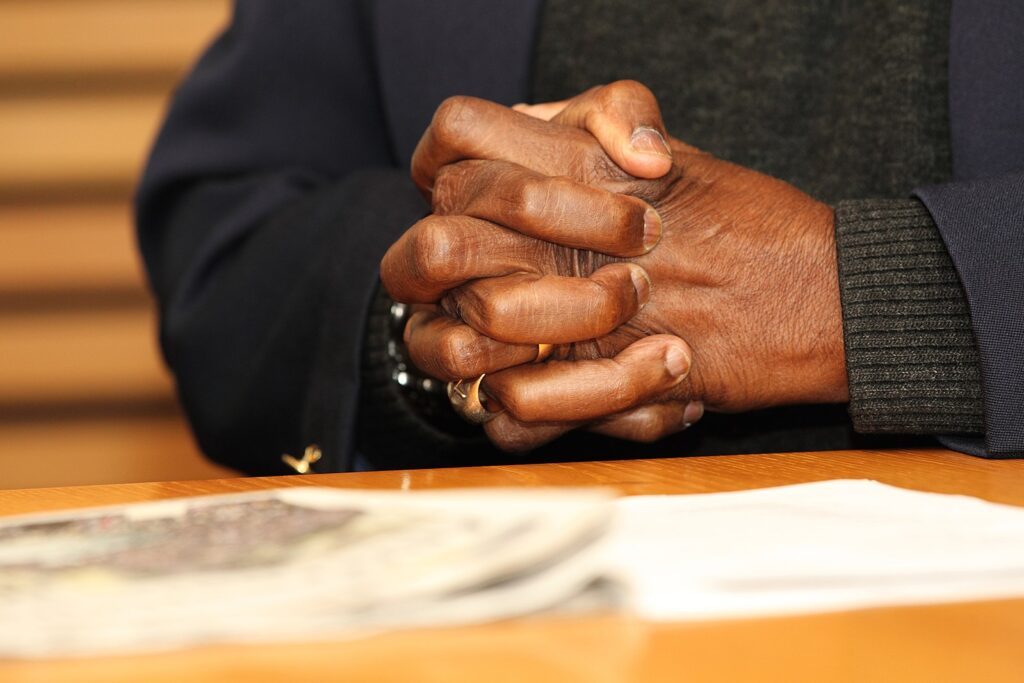
Desmond Tutu was a contemporary biblical prophet who used his prophetic voice to challenge Israel about its horrific treatment of the Palestinian people. Because he spoke in his own Christian and traditional African theological language, I will translate his message into mine: a Jewish version of our shared moral and religious commitments to peace and justice.
Tutu sometimes compared himself to Jeremiah because he could not keep silent in the face of injustice, and colleagues in South Africa believed he had the prophetic style of a man who acted intuitively, but not always consultatively (312). Like the prophets of old, however, he mixed his message of chastisement (you have woefully mistreated the Palestinian people) with a message of comfort (you too deserve safety and security in this land that you share with them). But Tutu was not always careful with his words, calling out the “powerful American Jewish lobby” for example, or failing to appreciate their adamant views about the uniqueness of the Holocaust, and that gave American and Israeli Jewish leaders an excuse to fear and dismiss him. It also gave the right wing the excuse to label him, inaccurately, as an antisemite, to which he replied:
Are you anti-Jewish? Not anti-Semitic. And then, you would have to say the same thing to the biblical prophets—because they were some of the most scathing critics of the Jewish leadership of their day. We don’t criticize Jewish people. We criticize, we will criticize, when they need to be criticized the government of Israel.
And he did so for forty years, from the early 1980s until his death in 2021. Tutu exemplified the patience of a prophet willing to repeat his message as often as necessary, until the government of Israel and its American Jewish supporters listened and changed their ways.
Tutu’s message of peace and justice begins with the God of the Exodus, the God of liberation, as Tutu described in a talk he gave to the Friends of Sabeel in 2002 and repeated in his foreword to Generation Palestine: Voices from the BDS Movement in 2013:
When our people groaned by virtue of the burden of racist oppression, we invoked the God who addressed Moses in the burning bush, we told our people that our God had heard their cry, had seen their anguish, and knew their suffering, and would come down, this great God of exodus, this liberator God as in the past to deliver us as God had delivered Israel from bondage. We told them that God was notoriously biased in favor of those without clout; the poor, the weak, the hungry, the voiceless.
It is that God that, Tutu knew, favored the enslaved over their oppressors, and was therefore also on the side of the Palestinians. Tutu’s theology had no place for the God of the conquest who oversaw the expulsion and destruction of the Indigenous peoples of the land that the Biblical authors claimed they then inhabited and named Israel and Judah, a vision of God that is also rejected by contemporary Jewish liberation theology. It is, unfortunately, the dominant theology of Israel today. This is the starting point of Tutu’s challenge: Israel must recognize the God that is being worshipped in the land today is the God of conquest and not the God of liberation, and that they are not one in the same.
Tutu delivered his message about Palestinian oppression to the Jewish supporters of Israel at the Jewish Theological Seminary in New York after winning the Nobel Peace Prize in 1984 when he said: “I am myself sad that Israel, with the kind of history and traditions her people have experienced, should make refugees of others. It is totally inconsistent with who she is as a people.” In that speech he critiqued not only the Nakba, but also the Sabra and Shatila massacre (when in 1982 in Beirut Christian phalangists murdered Palestinian inhabitants under the watchful eye of Israel’s Defense Forces who did nothing to stop the atrocities) and the barriers Israel set up between the holy places of Jews, Christians, and Muslims in Jerusalem. What Tutu pointed to here foreshadowed the separation wall and the barriers that exist today in Gaza.
In the gentlest of ways, Tutu critiques Jewish American and Israeli leaders for forgetting their own history of suffering, especially during the Holocaust. He contends that these memories should serve as a reminder to not make others suffer in similar ways: making them refugees, being responsible for their murders, creating barriers to their freedom of movement and worship. Translating the message into the language of Jewish ethical tradition, I would rely here on Hillel’s retort to the person who challenged him to explain the Torah while standing on one foot: “What is hateful to you, do not do to another—all the rest is commentary” (Shabbat 31a). From a Jewish ethical standpoint, I would add a longer list of hateful things that Tutu did not mention in detail:
- The seizing and destruction of Palestinian property (whole villages in 1948, houses and olive trees consistently since then), as was done to the Jews most dramatically on Kristallnacht and consistently thereafter.
- Intimidation expressed via epithets: “death to the Arabs” / “no dogs or Jews allowed.”
- Random acts of cruelty and humiliation perpetrated by soldiers, Israeli and Nazi.
- Bureaucratic harassment (identity documents and permits, border crossings delayed or not allowed, passports destroyed).
- Encouraging traitors (Palestinian informers and Jewish Capos).
- Separation walls and prison-like conditions in Gaza not unlike German work camps.
- Golda Meir blaming Arabs for making young Jewish men into killers; Nazis blaming Jews for all of Germany’s problems.
What was hateful to the Jewish people, Israel has done to the Palestinians.
When Tutu made a Christmas pilgrimage to the Holy Land sites in the occupied West Bank in 1989 he also visited Yad Vashem (the Holocaust Museum in Jerusalem), which, according to Roni Arieli is required by Israeli protocol for all diplomats coming to Israel for the first time. He described his response in his book, No Future Without Forgiveness:
I visited the Holy Land over Christmas 1989 and had the privilege during that visit of going to Yad Vashem, the Holocaust museum in Jerusalem. When the media asked me for my impressions, I told them it was a shattering experience. I added that the Lord whom I served, who was himself a Jew, would have asked, ‘But what about forgiveness?’ That remark set the cat among the pigeons. I was roundly condemned. (267)
Tutu’s prophetic and Christian vision required the next step: forgiveness. This was the key to the Truth and Reconciliation process he oversaw in South Africa and was deeply embedded in the teachings of Jesus (the Lord whom he served) and in the African traditional concept of ubuntu (compassion, humanness rather than victimization or turning the tables). Tutu was willing to allow that Jews were not able to forgive the Nazis, but as a prophet he needed to raise that possibility. And, it appears, except for the likes of Simon Wiesenthal and his followers, Jews (and particularly the Israeli government) have certainly forgiven the Germans.
I understand this through the lens of the Jewish ethical principle of teshuvah, the concept of return and repentance. Teshuvah is the central act performed on Yom Kippur. Jews are instructed to go over the ways they have missed the mark (often mistranslated as sin) and make restitution. If the error was against God, prayer and fasting will clear the record. If the error was against another human, one must ask forgiveness, and, according to tradition, make restitution. For Jews and Germans this has been well accomplished. Germany has apologized, made reparations where possible, financially supported Israel, made antisemitism a crime, and created memorials to the Holocaust in almost every city. It is clear that this history will be remembered. What Germany has not done is pay attention to the fact that they exist in a moral triangle, as Sa’ed Atshan and Katharina Galor point out in their book of that title. For while Germany has modeled teshuvah for Israel, they have not acknowledged the harm that the Holocaust set in motion that was the Nakba. This is a clear limitation on their expression of teshuvah, which in traditional Judaism is only complete when, given the opportunity, one don’t repeat one’s error.
Germany’s teshuvah, despite its limitations, could at least be a starting point for truth and reconciliation in Israel/Palestine. It must begin with Israel ending the occupation so they can begin the act of doing teshuvah: acknowledging the harms they have done to the Palestinian people, making reparations that allow for the literal “teshuvah,” or return of the Palestinians to their land, providing real financial restitution, ending acts and words of hate, correcting the historical record so that it won’t be forgotten, and being open to a different iteration of a one state solution which exists today, as Judith Butler pointed out many years ago, in abject form.
Can Tutu’s prophetic dream of peace and justice for Israelis and Palestinians come to be? Can Palestinians forgive if Israel does teshuvah? If violent and non-violent solutions have failed, perhaps what is needed is leadership, on both sides, of men and women with the religious values, moral clarity, and courage of Desmond Tutu to lead the way.


Good Day,
What a pleasant encounter, finding this article during this very troubling time in Gaza/Israel.
It might still be early but the narrative from his speeches are very scarce among commentators and especially in religious commentary though the Palestinian theologians are a beacon of light.
We live in hope…
Danie